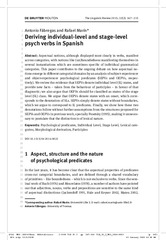Blar i forfatter Artikler, rapporter og annet (språk og kultur) "Fabregas, Antonio"
-
Argument structure and morphologically underived nouns in Spanish and English
Fabregas, Antonio (Journal article; Tidsskriftartikkel; Peer reviewed, 2014) -
Del subjuntivo como forma regente
Fabregas, Antonio (Journal article; Tidsskriftartikkel; Peer reviewed, 2014) -
Denominal action nouns in -ada
Fabregas, Antonio (Journal article; Tidsskriftartikkel; Peer reviewed, 2022-12)The existence of simple event nouns derived from nouns through -ada (niñada 'childish action', tontada 'stupid action', puñalada 'stabbing') raises different problems in our understanding of the relation between verbs and nouns or, in general, the way in which languages codify an action in a nominal domain. This work proposes that -ada reflects a structure wherre the eventdescribing heads are ... -
Deriving individual-level and stage-level psych verbs in Spanish
Fabregas, Antonio; Marín, Rafael (Journal article; Tidsskriftartikkel; Peer reviewed, 2015-04-28)Aspectual notions, although displayed most clearly in verbs, manifest across categories, with notions like (un)boundedness manifesting themselves in several instantiations which are sometimes specific of individual grammatical categories. This paper contributes to the ongoing debate on how aspectual notions emerge in different categorial domains by an analysis of subject-experiencer and object-experiencer ... -
Differential Object Marking in Spanish: state of the art
Fabregas, Antonio (Journal article; Tidsskriftartikkel; Peer reviewed, 2013)This state-of-the-art review tries to cover as much as possible about the properties, conditions and analyses of Differential Object Marking (DOM) in Spanish. Starting with some considerations about the boundaries of the phenomenon, it considers its morphological, semantic and syntactic properties –with respect both to the internal properties of the direct object and to the wider context in which ... -
Direccionales con 'con' y Marcado Diferencial de Objeto
Fabregas, Antonio (Journal article; Tidsskriftartikkel; Peer reviewed, 2015)An understudied property of Spanish grammar is the possibility of obtaining a directional reading with a PP introduced by con ‘with’, as in Ven con papá ‘Come to daddy’. This work explores this construction taking into account both the properties of the verb and the prepositional phrase, identifying as one of the restrictions that the preposition must in such cases introduce an animate noun; this ... -
El argumento espacio-temporal de algunos verbos meteorológicos
Fabregas, Antonio (Journal article; Tidsskriftartikkel; Peer reviewed, 2014) -
The emergence of middle voice readings with and without agents
Fabregas, Antonio; Putnam, Michael T. (Journal article; Tidsskriftartikkel; Peer reviewed, 2014-05-30)This article presents evidence that, cross-linguistically or within the same language (family), there appears to be no morphosyntactic properties and/ or structures specifically designated for the formation of middle voice constructions. What has been labeled a ‘middle voice construction’ is a semantic interpretation that, crucially, is blocked when an event variable is existentially closed by T. ... -
A guide to IL and SL in Spanish: Properties, problems and proposals
Fabregas, Antonio (Journal article; Tidsskriftartikkel; Peer reviewed, 2012)This article provides with a state of the art of how the Individual Level / Stage Level distinction –and the related but distinct issue of the distribution of ser / estar– is instantiated in Spanish. We argue that the IL / SL distinction can be understood in two different ways: as a contrast between properties predicated of an individual or of a stage of that individual, and as a contrast between ... -
Inclusive gender: A grammatical view
Fabregas, Antonio (Journal article; Tidsskriftartikkel; Peer reviewed, 2022-12-01)En los últimos años se ha visto emerger un nuevo marcador de género en español al que se identifica como género inclusivo, lo cual da lugar a sustantivos con tres formas de género –niño, niña, niñe–. El objetivo de este trabajo es alejar esta cuestión de consideraciones políticas o sociales y examinar los rasgos gramaticales internos que tiene esta nueva forma, como una vía para encuadrar cualquier ... -
Los genitivos múltiples en español: restricciones léxicas y sintácticas
Fabregas, Antonio (Journal article; Tidsskriftartikkel; Peer reviewed, 2014) -
Not all locative subjects are arguments: two classes of weather verbs
Fabregas, Antonio (Journal article; Tidsskriftartikkel; Peer reviewed, 2013) -
Notes on exponents. A review of J. Trommer (ed.), The morphology and phonology of exponence
Fabregas, Antonio (Journal article; Tidsskriftartikkel; Peer reviewed, 2014) -
On the representation and selection of exponents
Fabregas, Antonio; Krämer, Martin; McFadden, Thomas (Journal article; Tidsskriftartikkel; Peer reviewed, 2014)This article provides the reader with a general introduction to the main issues in the study of the lexicon, setting the context in which the articles presented in this volume appear. We concentrate on three questions that we consider crucial for a study of listedness: what is listed, how it is listed and how alternation and variation are expressed. We address these issues in the three main areas ... -
Por qué vienen palabras (complejas) en los diccionarios.
Fabregas, Antonio (Journal article; Tidsskriftartikkel; Peer reviewed, 2023-03-27)Una dificultad aparente para cualquier sistema que proponga procedimientos generativos en la formación de palabras es el hecho de que los diccionarios deben incluir muy frecuentemente algunas palabras complejas incluso cuando no tienen valores idiosincrásicos. Este artículo argumenta que el problema se disuelve cuando se atiende a dos hechos gramaticales: la selección se produce de un núcleo a ... -
Un análisis sintáctico de dos tipos de causante
Fabregas, Antonio (Journal article; Tidsskriftartikkel; Peer reviewed, 2014-12-15)Este trabajo muestra que, sobre la suposición de que los papeles temáticos deben corresponder a posiciones específicas dentro de una jerarquía sintáctica, deben distinguirse dos tipos de causantes. Combinando pruebas sintácticas y semánticas tomadas de (a) los participios resultativos; (b) las nominalizaciones eventivas y (c) las construcciones causativas se argumenta que hay un causante directo, ... -
Un aspecto de la sintaxis de los cardinales complejos
Fabregas, Antonio (Journal article; Tidsskriftartikkel; Peer reviewed, 2014)


 English
English norsk
norsk















